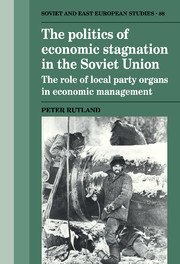 The Politics of Economic Stagnation in the Soviet Union
The Politics of Economic Stagnation in the Soviet Union Published online by Cambridge University Press: 06 July 2010
This chapter investigates the principles underlying party interventions in the economy, and the institutional apparatus through which such interventions took place. The CPSU saw itself, according to Article 6 of the 1977 Constitution, as ‘The leading and guiding force of Soviet society and the nucleus of its political system and of all state and public organizations.’ This involved responsibility for the whole range of social and political activity, from child-rearing to national defence. Within this spectrum of involvement, economics played a pivotal role.
In the Brezhnev era the party pledged to put the USSR through ‘accelerated socio-economic development’ so that they could further perfect ‘developed socialism’. This involved the party in both the ‘leadership’ (rukovodstvo) and ‘direction’ (napravlenie) of Soviet society: setting the general goals for social development and taking concrete steps to ensure that they are brought to fruition. This meant that the CPSU committed itself to active involvement in the economy. When Soviet writers talked of obeying the ‘laws of social development’ or a ‘scientifically based economic policy’ they were not suggesting a hands-off approach. Socio-economic laws, unlike the laws of physics, would not unfold by themselves, but required active human involvement. The Brezhnev leadership made great play of its ‘scientific’ approach to social problems, using this to distinguish its own interventions from Khrushchev's ‘voluntaristic’ interference.
To save this book to your Kindle, first ensure no-reply@cambridge.org is added to your Approved Personal Document E-mail List under your Personal Document Settings on the Manage Your Content and Devices page of your Amazon account. Then enter the ‘name’ part of your Kindle email address below. Find out more about saving to your Kindle.
Note you can select to save to either the @free.kindle.com or @kindle.com variations. ‘@free.kindle.com’ emails are free but can only be saved to your device when it is connected to wi-fi. ‘@kindle.com’ emails can be delivered even when you are not connected to wi-fi, but note that service fees apply.
Find out more about the Kindle Personal Document Service.
To save content items to your account, please confirm that you agree to abide by our usage policies. If this is the first time you use this feature, you will be asked to authorise Cambridge Core to connect with your account. Find out more about saving content to Dropbox.
To save content items to your account, please confirm that you agree to abide by our usage policies. If this is the first time you use this feature, you will be asked to authorise Cambridge Core to connect with your account. Find out more about saving content to Google Drive.